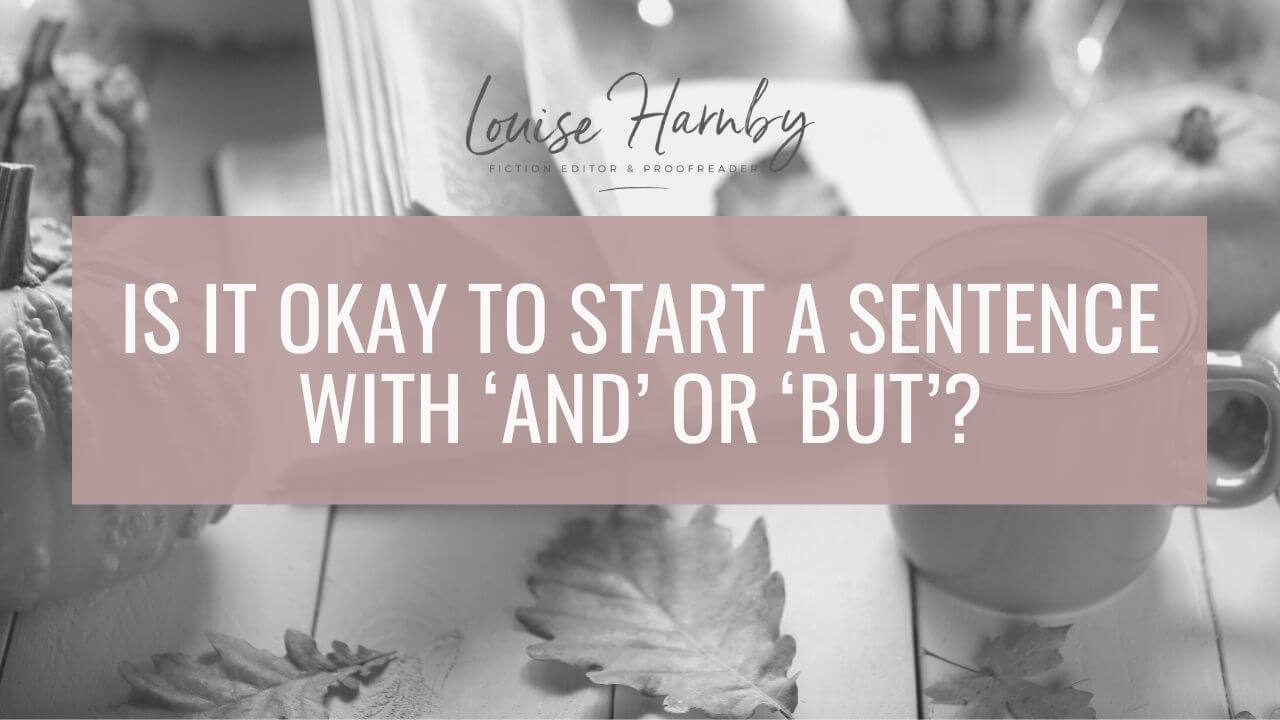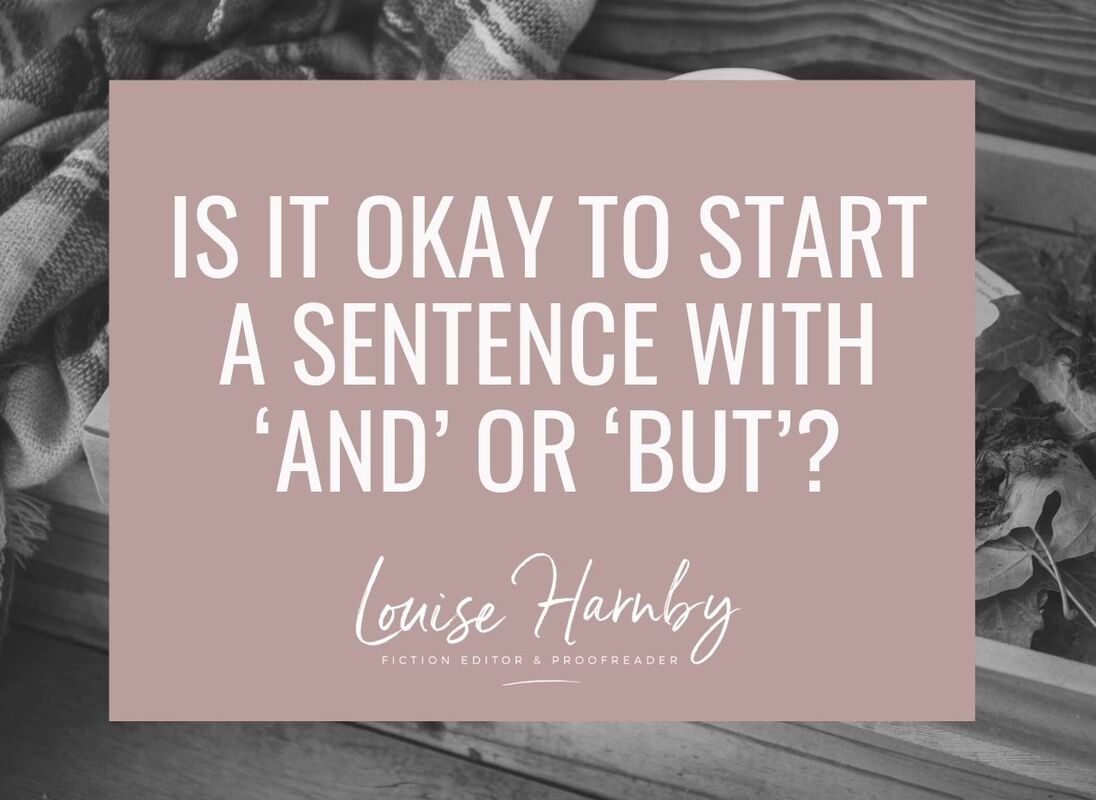|
Good news! It is perfectly okay to start a sentence with ‘And’ or ‘But’ in fiction writing. Doing so can enrich narration and dialogue, and inflect the prose with voice, mood and intention. The key is to make sure those conjunctions are being used purposefully and logically. This post shows you how.
What the style guides say
Here's what two industry-recognized style guides have to say on the matter. New Hart’s Rules (Oxford University Press): ‘You might have been taught that it’s not good English to start a sentence with a conjunction such as and or but. It’s not grammatically incorrect to do so, however, and many respected writers use conjunctions at the start of a sentence to create a dramatic or forceful effect.’ Chicago Manual of Style Online, 5.203 (Chicago University Press): ‘There is a widespread belief—one with no historical or grammatical foundation—that it is an error to begin a sentence with a conjunction such as and, but, or so. In fact, a substantial percentage (often as many as 10 percent) of the sentences in first-rate writing begin with conjunctions. It has been so for centuries, and even the most conservative grammarians have followed this practice.' 6 good reasons to start a sentence with ‘And’ or ‘But’ Great! We have the go-ahead from a couple of big hitters to use our two conjunctions at the beginning of a sentence. Now let’s dig a little deeper into why doing so can make fiction more effective. Here are my top six reasons:
Serving natural speech When we speak in real life, conjunctions are often the first things out of our mouths. So it should be in novels that want to render speech authentically. Fictional dialogue doesn’t replicate real-life speech completely – that would mean including a lot of boring stuff that one might hear at the bus stop. Rather, it’s a sort of hybrid that has the essence of reality but with the mundanity judiciously removed. It might sound like a cheat but readers thank authors who don’t bore them! Small nudges towards reality help with the authenticity goal, which is where our conjunctions come in handy. Here are a few examples for you:
Shortening narrative distance Dialogue gives us the character’s speech; narrative gives us the character’s experience. When that’s a first-person narrative, it’s easy to feel close to the narrator. With a third-person narration, the reader can feel separated from the character, as if they’re on the outside looking in. Authors who want to reduce that space between the reader and the character – called narrative distance or psychic distance – can experiment with a narration style that sounds like natural speech even though it’s not dialogue. Here’s a lovely example from Blake Crouch’s Recursion (p. 182).
Notice how the narration style is third person, though it doesn’t feel like it. Instead, we’re right inside the viewpoint character’s head. The position of the conjunction in this example isn’t the sole reason why the narrative distance feels short – the free indirect speech above and beneath plays a huge part – but it certainly helps to give us a sense of the character’s mentally working out a problem. Introducing tension and suspense Take a look at this excerpt from p. 21 of The Matlock Paper by Robert Ludlum.
With that one word – the conjunction – Ludlum stops us in our tracks. Yes, we’re thinking, the town’s neat, it’s clean. All well and good. But then we realize that there’s more to it, for beneath the pruned trees lies a dark underbelly. The ‘And’, positioned right up front, forces us to pay attention to it. It’s not any old conjunction. Rather, it’s loaded with suspense that drives the reader to ask a question that isn’t explicitly answered: What else is that ‘something’? Adding drama and modifying rhythm In this excerpt from Parting Shot (p. 433), the author uses the conjunction at the beginning of the sentence to inject drama into a scene. The new line makes the rhythm of the prose more staccato, but the ‘And’ at the beginning of the final line is what really packs a punch. The viewpoint character, Cory, is a killer. He ponders almost matter-of-factly who the threats are, and reaches his conclusion as he closes in on the cabin.
If Linwood Barclay had omitted the conjunction, he’d have introduced a separation between two ideas: realizing what needs to be done, and when the killer is going to do it. Yet these two ideas are very much connected. The ‘And’ therefore fulfils its purpose as a conjunction – a joining word. But there’s more. If he’d run the two ideas together with a conjunction between (‘It seemed clear what he had to do, and he'd have to do it fast.’), the line would have lost its wallop. The staccato rhythm (one that mirrors the cold calculation taking place in Cory’s head) is gone. Instead, the prose has flatlined; it seems almost mundane, like a stroll in the park rather than the planning of a murder. However, the ‘And’ reinforces this extra information – the deed must be done fast. The emphasis adds drama to the line. The final line is still connected to the clause it’s related to, but the mood-rich rhythm, and the drama that comes with it, is intact. Emphasizing the unexpected An up-front ‘But’ is perfect for the author who want to emphasize the unexpected, surprise or absurdity. Take a look at this excerpt from Terry Pratchett’s Dodger (p. 170). It’s true that omitting the ‘But’ would leave the meaning intact. However, adding the conjunction reinforces the Dodger’s emotional response to the boy’s suggestion – he’s taken by surprise because in times past, asking a peeler was exactly what he’d have done, without question, without fear. And so that ‘But’ does more than act as a conjunction. With just three letters, we’re shown character mood. Making contrast explicit and suspenseful David Rosenfelt’s New Tricks (p. 92) includes a smashing example how the conjunction at the beginning of the sentence reinforces a contrast with what’s gone before.
That contrast is explicit because the ‘But’ acts as an interrupter. We’re deep in the POV character’s head regarding the murder victim, ruminating with our protagonist. The conjunction then shoves us out of that rumination. It’s not gentle; the ‘But’ is a big one – something’s up with Laurie. Not that we know what. Rosenfelt doesn’t tell us yet. Instead, he makes us ask the question: Why? And with that question, just as with the Ludlum example above, we have suspense. Summing up Feel free to pepper your prose with sentences that begin with ‘And’ and ‘But’. Anyone who tells you you’re on shaky ground grammatically knows less about grammar than you do! It’s likely that the myth around positioning these conjunctions came about in a bid to nudge people away from stringing together clauses and sentences with no thought to creativity. And while such an intention makes sense, we have to recognize that imposing this zombie rule on writing can actually destroy the magic of prose. And on that note, I will sign off! (See what I did there?) More fiction editing guidance
Cited sources
Louise Harnby is a line editor, copyeditor and proofreader who specializes in working with crime, mystery, suspense and thriller writers.
She is an Advanced Professional Member of the Chartered Institute of Editing and Proofreading (CIEP), a member of ACES, a Partner Member of The Alliance of Independent Authors (ALLi), and co-hosts The Editing Podcast. Visit her business website at Louise Harnby | Fiction Editor & Proofreader, say hello on Twitter at @LouiseHarnby, connect via Facebook and LinkedIn, and check out her books and courses.
2 Comments
Lindsey Russell
13/11/2020 09:05:45 pm
Assume this applies to 'So . . .' as well, though perhaps more in dialogue than narrative - unless it's internal ruminations? :)
Reply
Louise Harnby
14/11/2020 11:17:28 am
Spot on, Lindsey.
Reply
Leave a Reply. |
BLOG ALERTSIf you'd like me to email you when a new blog post is available, sign up for blog alerts!
TESTIMONIALSDare Rogers'Louise uses her expertise to hone a story until it's razor sharp, while still allowing the author’s voice to remain dominant.'Jeff Carson'I wholeheartedly recommend her services ... Just don’t hire her when I need her.'J B Turner'Sincere thanks for a beautiful and elegant piece of work. First class.'Ayshe Gemedzhy'What makes her stand out and shine is her ability to immerse herself in your story.'Salt Publishing'A million thanks – your mark-up is perfect, as always.'CATEGORIES
All
ARCHIVES
July 2024
|
|
|
|

























 RSS Feed
RSS Feed





